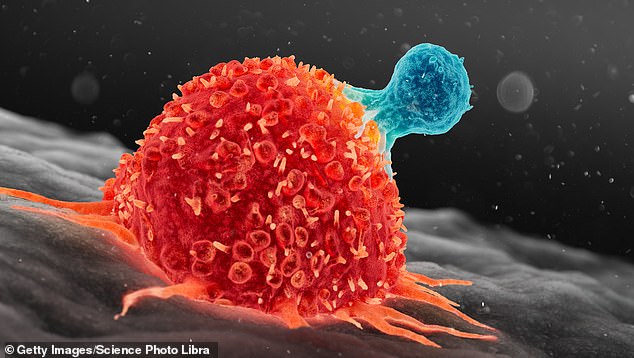Tragic new details about dozens of American patients whose life-saving cancer treatment caused them to develop more cancers
Doctors are being warned that life-saving cancer therapy could in rare cases cause new tumors.
In a report in the New England Journal of Medicine, researchers urged doctors to “be on the lookout” for unusual symptoms in patients receiving CAR-T therapy.
Twenty-five of the approximately 30,000 people in the US have been diagnosed with secondary cancer after receiving treatment for another form of cancer.
CAR-T – which was approved in 2017 – takes immune cells from the body and causes them to attack tumors before injecting them back into the blood.
CAR-T therapies, or chimeric antigen receptor T cell therapies, were first approved in November 2017 and are reserved for cancer patients who would otherwise die without this therapy
But the way it is administered can disrupt cell DNA and lead to other cancers, which is a small risk with all so-called gene therapies.
This, the study authors emphasize, is a very rare scenario. According to their reports, more than 1 percent of people who received CAR-T therapy developed a secondary cancer as a result.
But another new study oncologists from Stanford published in the same journal, found that as many as 6.5 percent of patients developed secondary cancer in the three years after receiving CAR-T therapy.
Even with these risks, CAR-T therapy has saved the lives of many more people than it endangers, the authors wrote in both new papers.
It has been especially critical in treating people who have not responded to other therapies.
But as rare as this condition is, they want to raise awareness of it so oncologists can be alert to new cancer developments in their patients, said Dr. Metin Ozdemirli, a professor of pathology at Georgetown and co-author of the paper.
“Knowing what to look for in advance makes it easier to spot problems earlier,” said Dr. Ozdemirli.
This is especially sensible if trends continue and the therapy becomes more widespread. The FDA announced a review of the therapy in November 2023 to investigate 19 of these cases.
The NEJM report, published by oncologists and pathologists from Georgetown University Hospital, presented the case study of a 71-year-old woman who had been battling cancer for eight years.
She received CAR-T therapy to treat myeloma, a form of cancer that attacks the white blood cells in your bones.
After the treatment, doctors ran tests and found that there were no signs of cancer left in her system.
Four months later, the patient returned to the doctor after suddenly losing 12 pounds and developing persistent diarrhea.
Doctors performed a blood test and passed a tube through the patient’s gastrointestinal tract to determine the cause – narrowing in on a series of abnormal cells in the intestine.

An illustration of a T cell, blue, attacking a cancer cell, red
They initially diagnosed her with an autoimmune disease and gave her steroids to treat the condition.
But when she didn’t get better, doctors took a biopsy of a wound in her small intestine and discovered the truth: she had cancer again.
This time, about nine months after CAR-T treatment, the patient had developed lymphoma, a form of cancer that attacks the body’s immune system.
When the scientists analyzed the DNA of the new cancer cells, they determined that they had likely grown from the immune cells that the patient had been treated with to initially cure their myeloma.
Scientists don’t yet understand how this happens, but theorize that the cells they collected from the patient to make the therapy may have had cancer mutations. If that were the case, the cells could have grown into cancer when they were placed in the patient.
The cells could also have mutated after they were removed and before they were developed to serve as a therapy, or after they were reintroduced into the patient’s body, the case study explained.
Regardless of when the mutations developed, they caution that healthcare providers should consider this rare side effect of treatment when using CAR-T therapy.
The patient has yet to beat this new round of cancer, but as of April 2024, her symptoms have improved somewhat, the report said.
